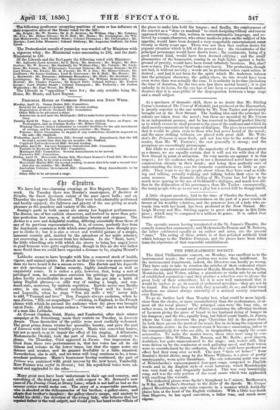THE PFIILHARMONIC SOUtaTY.
The third Philharmonic concert, on Monday, was excellent as 'to the instrumental music; the vocal portion was worse than indifferent. In the irustrumentalrdepartment, indeed, the Directors can hardly go wrong. They have only to take in rotation the articles of their orchestral reper-
toire the symphonies and overtures of Haydn, Mozart, Beethoven, Spohr, Mendelssohn, and Weber, adding a pianoforte or violin solo by an,artist of established reputation—and they produrp a selection sure to please the great body of their subscribers : for it is now well understood that it would be useless to go in search of orchestral novelties—they are not ter be found. But where they can fail, they generally do so ; and their vocal selections are almost always unworthy of a musical society renowned.' over Europe.
To go no farther back than Monday last, what could be more injudi-,
cious than the choice, or more unsatisfactory than the performance, of al- most all the vocal pieces-? The principal ones were the 'long trio, or rather scene, in the second act of .FUlelio, containing the affecting incident of Leonora giving the piece of bread to her husband dying of hanger in his dungeon; and the trio, equally long, but full of -comic bustle, in ligaro, where the Count discovers the page Cherubino hid in the great chair. In both these pieces the merit of the music lies in its being-the exponent of. the dramatic action : in the concert-room it becomes unmeaning, unless to the comparatively few who are able, in imagination, to supply the scenic accessories. To make the matter worse, these trios were Bung by con-, cert-singers—Miss Williams, Mr. Benson, and Mr. Bodda ; good singers,, doubtless, but quite unaccuatomed to the stage ; and, worser stall, they were driven On 'by the conductor at such galloping speed, and their voices, were so overwhelmed by the orehestra, that they could have produced no effect 'had they sung ever so well. The dnet " Quis et home ? " from' Rossini's Stabat Mater, sung by the Misses Williams, is a piece of pretty- nambypamby, worn quite threadbare. The sole redeeming point was one: of liendelssohn's unaccompanied four-part songs, composed to Ettflush;' words and in the English style of vocal harmony, which Mendelssohrt
was very fond and frequently imitated. This was very beautifully . sung, and was the only portion of' the vocal music which was applauded. with anything like warmth. -The orchestral pieces were Spohr's Symphony in C minor, Beethoven's,
in B flat, and Weber's Overture to the Ruler of the Spirits. Mr. Cooper . played Mendelssohn's only violin concerto in a manner which decidedly places him at the head of the English violinists. With a little less finish - than Blagrove, he has equal execution, a fuller tone, and much more " vigour.


























 Previous page
Previous page